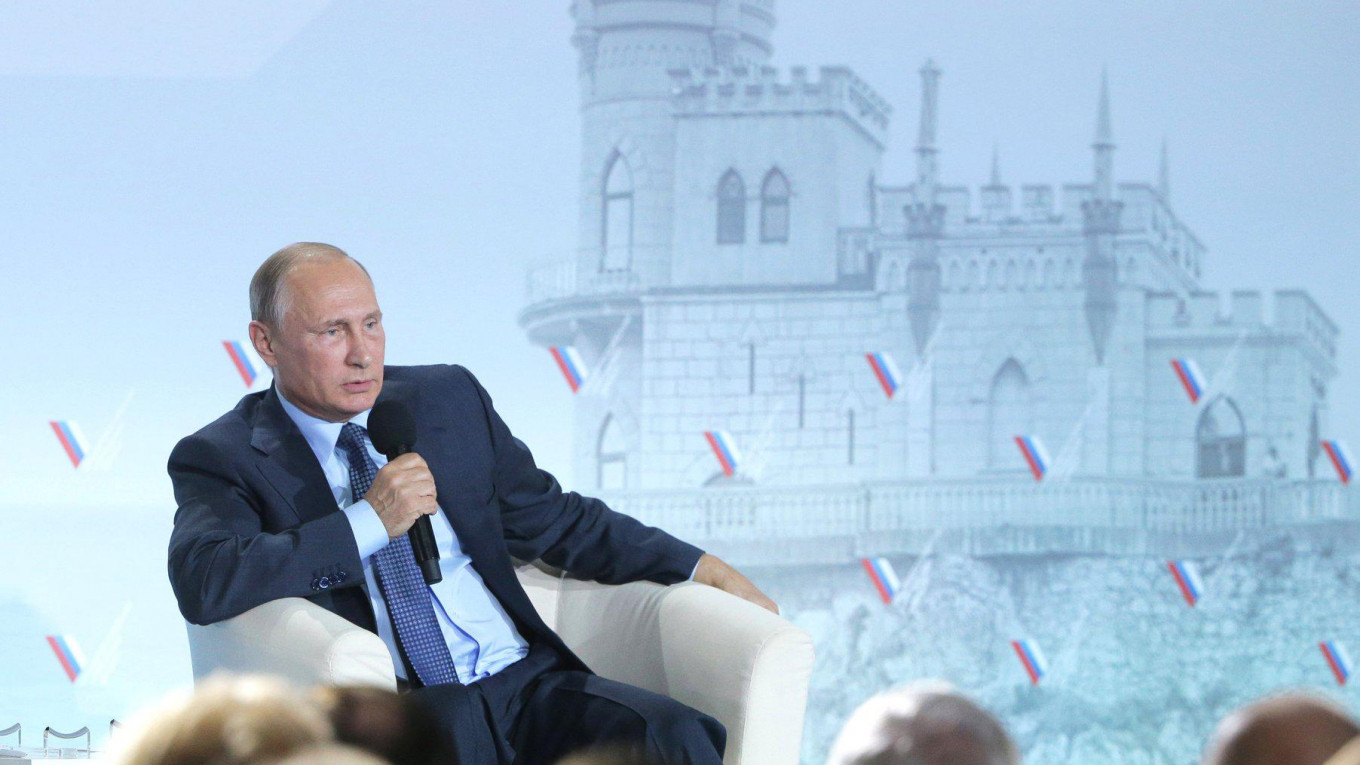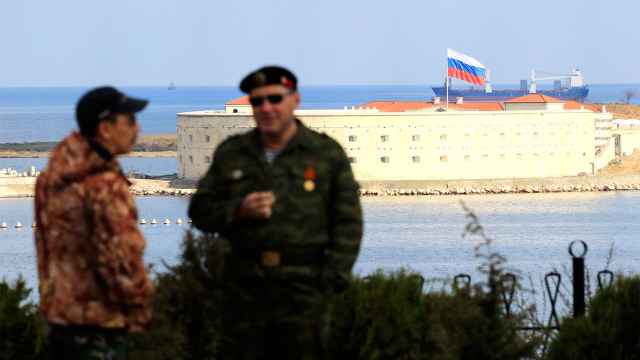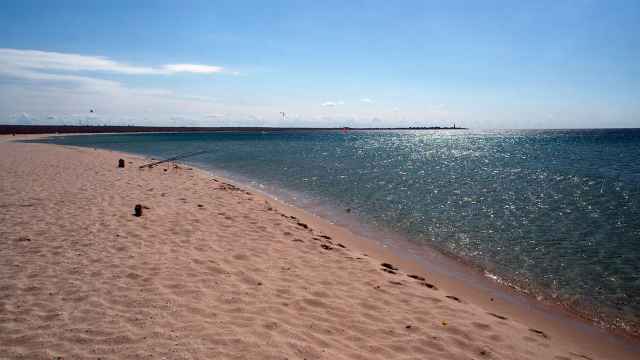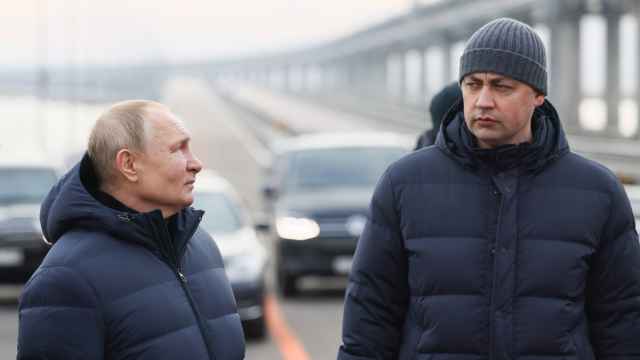On Wednesday, Russian President Vladimir Putin traveled to Yalta on the contested Crimean peninsula, where he addressed a forum by the All-Russia People's Front, a political movement Putin started in 2011 to coexist with the United Russia political party.
Hours after Putin’s speech, the Ukrainian Foreign Ministry sent Moscow a formal letter of protest, claiming that Putin failed to obtain Kiev’s permission to set foot in “Ukrainian territory occupied by the Russian Federation.” This wasn’t the first time Ukraine has sent such a letter, and it’s not likely to be the last.
Moscow has exercised de facto sovereignty over Crimea for more than two years now, and Putin has visited a handful of times. The Moscow Times reviews five major points the president made in his speech today.
Ukraine's “amazing idiots” and “crimes against humanity”
For the past year, activists in Ukraine, apparently operating without much interference from Ukrainian state officials, have repeatedly sabotaged power bridges that supply electricity to Crimea’s population of 2.6 million people. Ukrainian electricity providers have also blamed faulty equipment for disruptions to Crimea’s energy supply.
According to President Putin, Ukraine’s actions border on “crimes against humanity.” “And the human rights organizations don’t say a word,” he warned. “They clam up and go silent, but in fact we’re looking at a serious crime.”
“I can tell you my feelings on the matter,” Putin said. “I’m simply in awe of the people who live in Crimea and in Sevastopol, and I admire how they’ve reacted to what’s happening. They display real composure, courage, and a willingness to fight for their own interests. The people [in Ukraine] who did all this — it’s so stupid…. What were they hoping to achieve? I don’t even know — that everyone would fall to their knees and beg for a handout? It’s simply amazing. These people are amazing idiots.”
A bridge across the Kerch Strait, linking mainland Russia and Crimea, is still coming
In September 2016, the U.S. Treasury Department added several companies and individuals involved with the bridge’s construction to Washington’s sanctions blacklist against Russia. Despite this and reports that the bridge will be susceptible to mud volcanoes and earthquakes, the project is scheduled to be completed in December 2018.
According to preliminary calculations, thе bridge will accommodate 14 million tourists and somewhere up to 13 million transport vehicles every year, Putin said. There’s a train planned, too, that will run parallel in both directions.
“It’s entirely possible to imagine further subsidies for the development of the Kerch bridge’s road infrastructure,” Putin said. “If we come to this, the money would go to concrete projects, so it didn’t just dissolve to who knows where.”
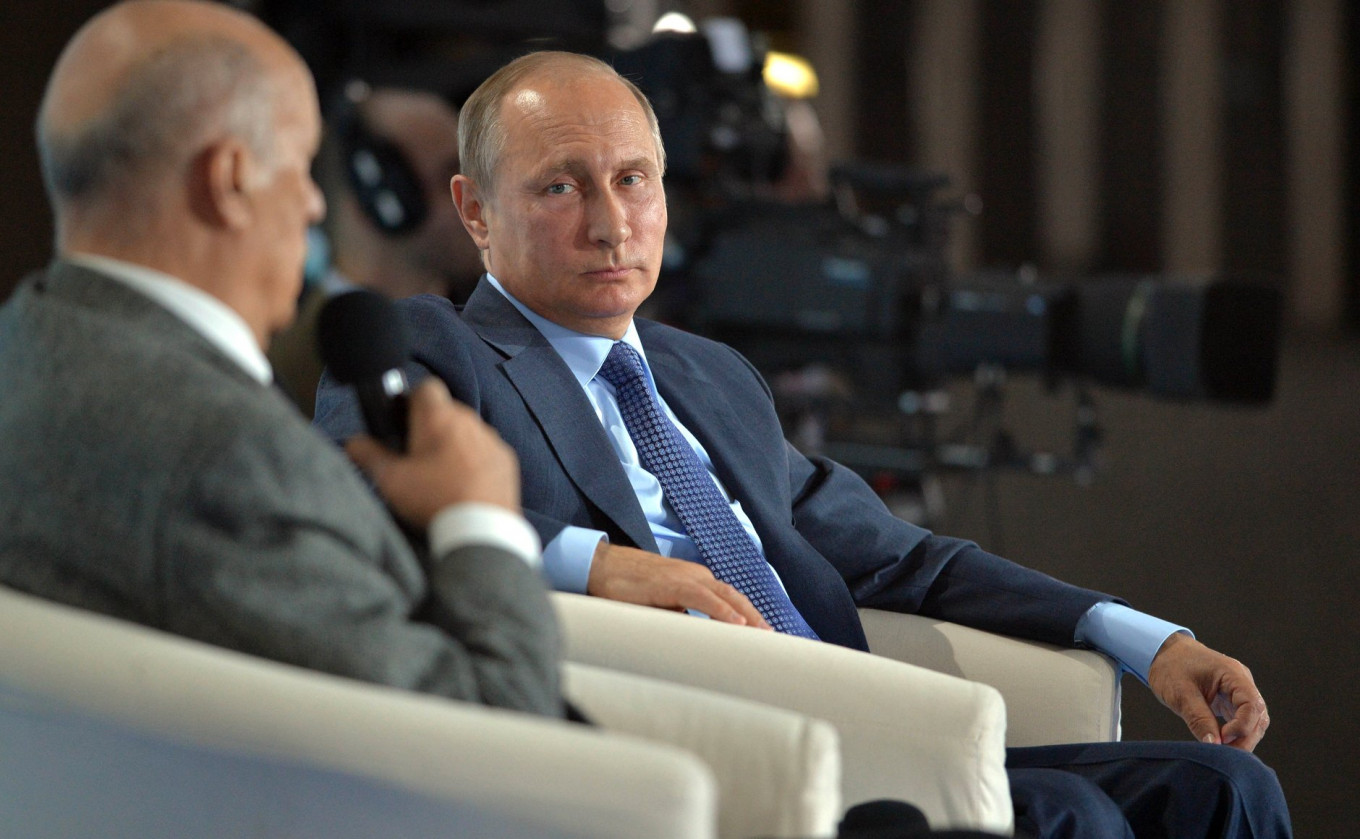
Crimea is Russia's “jewel”
Putin praised the “large-scale, time-consuming work” that’s helped integrate Crimea into Russia’s “unified legal, economic, and social space.” “The committed, active attitude of the people of Crimea and Sevastopol, their energy, and determination to get results has played an important role in this process,” Putin said.
“In terms of cultural heritage,” the president said, “Crimea is the jewel of Russia.” He went on to say that Russia owes important aspects of its history, “spiritually and mentally,” to Crimea.
On support for repressed nations
Putin says Russia is spending 10 billion rubles ($159 million) to support and rehabilitate ethnic groups who suffered during the Soviet repressions. “Foremost, this concerns socio-economic support, because the political issues have all been resolved,” Putin said, referring to issues of language, culture, and access to education in a native language.
In May 2016, Ukraine unexpectedly defeated Russia in the Eurovision Song Contest, thanks to the performance of Jamala, a Ukrainian musician of Crimean Tatar origin, who sang about the plight of the Tatar minority deported from Crimea under Joseph Stalin.
A month before losing Eurovision, Russia banned the Crimean Tatars’ legislature, the Mejlis, labeling it an extremist organization. Russian police in Crimea have repeatedly detained Tatar leaders, including Ilmi Umerov, the deputy chairman of the Mejlis, who still actively campaigns against Russia’s territorial claims on the peninsula, encouraging further international sanctions against Moscow.
On rescuing tourism
The return of cruise ships to Crimea should be a private initiative that everyone should support. Cruise ships, Putin said, are integral to life across Russia’s Black Sea region. “In Soviet times,” Putin recalled, “I myself used this kind of transportation. Once I went from Abkhazia to some other places, then to Odessa, and finally I took the train to Leningrad. I’m sure there will be lots of people who want to travel like that in the summer.”
Despite new obstacles to reaching popular foreign destinations like Turkey and Egypt, demand for flights to Simferopol among tourists declined by more than 25 percent in 2016. Analysts have attributed the falling popularity of Crimea among Russian travelers to the lack of service infrastructure on the peninsula.
A Message from The Moscow Times:
Dear readers,
We are facing unprecedented challenges. Russia's Prosecutor General's Office has designated The Moscow Times as an "undesirable" organization, criminalizing our work and putting our staff at risk of prosecution. This follows our earlier unjust labeling as a "foreign agent."
These actions are direct attempts to silence independent journalism in Russia. The authorities claim our work "discredits the decisions of the Russian leadership." We see things differently: we strive to provide accurate, unbiased reporting on Russia.
We, the journalists of The Moscow Times, refuse to be silenced. But to continue our work, we need your help.
Your support, no matter how small, makes a world of difference. If you can, please support us monthly starting from just $2. It's quick to set up, and every contribution makes a significant impact.
By supporting The Moscow Times, you're defending open, independent journalism in the face of repression. Thank you for standing with us.
Remind me later.


